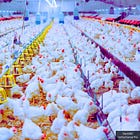USDA Approves New Dog Flu Vaccine That May Trigger PCR Positives—No Public Safety Data, Elanco Cites 2005 Study on Different Product
Could vaccinated pets trigger PCR tests to justify fake influenza “outbreaks”?
The U.S. government has approved a new flu vaccine for dogs that may inject pets with genetic material capable of being detected by PCR tests, raising the alarm that pet vaccination could be used to fabricate outbreaks and justify authoritarian pandemic measures.
On July 9, the U.S. Department of Agriculture (USDA) granted full approval to Elanco Animal Health’s TruCan™ Ultra CIV H3N2/H3N8 canine influenza vaccine.
But Elanco has published no peer-reviewed safety data for the specific product.
Instead, it promotes the vaccine using:
A 2005 study on unrelated vaccines,
Three internal studies not available to the public, and
Two USDA licensing documents that simply confirm regulatory paperwork was completed, not that the product is independently safe or necessary.
This rollout is occurring just as governments around the world ramp up bird flu vaccine campaigns, fund gain-of-function H5N1 virus research, and prepare for the possibility of a zoonotic pandemic.
PCR testing could detect remnants of the vaccine itself, reclassifying vaccinated pets as “infected” and triggering government-imposed lockdowns or surveillance measures under pandemic protocols.
Follow us on Instagram @realjonfleetwood & Twitter/X @JonMFleetwood.
If you value this reporting, consider upgrading to a paid subscription.
A Vaccine Without Published Safety Data
Despite marketing the new shot as “the only 0.5 mL bivalent” flu vaccine for dogs offering “100% virus neutralization” and “zero lung lesions” post-challenge, Elanco’s press release justifies these claims with:
“Data on File” studies not subject to peer review,
USDA summaries used for basic product licensing,
And no external evidence verifying safety in real-world conditions.
Elanco further implies safety by citing a 2005 JAVMA study that evaluated adverse events in 1.2 million dogs vaccinated with now-defunct Fort Dodge products, not with TruCan™, PureFil™, or any influenza vaccines.
In fact, Elanco’s TruCan™ Ultra product line didn’t exist when that study was published.
Influenza Pandemic Infrastructure: Veterinary Stage Now Set
The timing of this new veterinary flu shot aligns with a sweeping global campaign to prepare for an avian influenza pandemic, one that critics warn is being quietly constructed through:
Gain-of-function bird flu engineering in U.S., China, Japan, Brazil, South Korea, and the Netherlands,
Strain-mismatched, fast-tracked poultry vaccines conditionally approved without public data,
And broad pandemic legislation and funding, including the U.S. Trump administration’s $500 million “universal flu vaccine” initiative launched in May.
As previously reported, South Africa is now vaccinating 200,000 chickens with one of three approved H5 bird flu vaccines in the country, each containing viral genetic fragments that could be detected by PCR tests even in the absence of natural infection.
In the U.S., Zoetis—a Pfizer offshoot—was granted a conditional license for an H5N2 poultry vaccine, even though the circulating strain is H5N1.
No public justification or safety data has been released, prompting this reporter to submit a FOIA request to the USDA for answers.
The U.S. is also injecting cattle with experimental mRNA bird flu vaccines developed by NIH and USDA in partnership with Pfizer-linked patent holders, without disclosing long-term safety, tissue persistence, or food chain risks.
Could Vaccinated Pets Trigger Fake ‘Outbreaks’?
The central concern: If flu-vaccinated dogs test PCR-positive for influenza RNA, even without illness or infection, governments could treat these results as “outbreaks,” activating the legal machinery of lockdowns, quarantines, and emergency powers.
This concern is far from hypothetical.
During the COVID era, PCR tests were widely used as the primary metric for declaring cases and triggering restrictions, even when test sensitivity picked up non-infectious or residual fragments.
With a new generation of animals injected with genetic materials, the same false-positive dynamic could play out again.
This raises the question: Are governments laying the foundation to justify future lockdowns not based on actual viral spread, but on manufactured PCR positivity from vaccinated pets?
If so, the approval of TruCan™ Ultra CIV may be less about animal health and more about pre-positioning a domestic justification for human control measures, one PCR test at a time.
No Answers, No Transparency
Elanco has offered no real-world safety data for its new flu shot.
The only third-party citation in its marketing materials is a 20-year-old study on completely different vaccines.
Its internal studies remain sealed.
When we reached out to Elanco, a representative claimed they didn’t have the studies on hand.
And the USDA’s approval, while regulatory, was not accompanied by any public safety briefing or independent advisory report.
If the government is willing to inject millions of family pets with influenza genetic material without public scrutiny, what else is it preparing for?
Follow us on Instagram @realjonfleetwood & Twitter/X @JonMFleetwood.
If you value this reporting, consider upgrading to a paid subscription.
For advertising & sponsorship opportunities reaching 230,000+ monthly viewers, contact us by clicking below.












I love it! Veterinarians are paid vax-pushers, and I try to stay the hell out of their offices.
Injection site sarcoma is a thing.
I am now of the very strong opinion that All vaccines are intended to cause harm.
Stay out of the veterinary office unless you need to spay or neuter.
And I’m also of the mindset that all PCR tests are fraudulent pieces of shit, intended to create false statistics of illness, and to further promote and perpetuate a harmful jab-schedule.
Wow, I've never known a dog to have the flu.